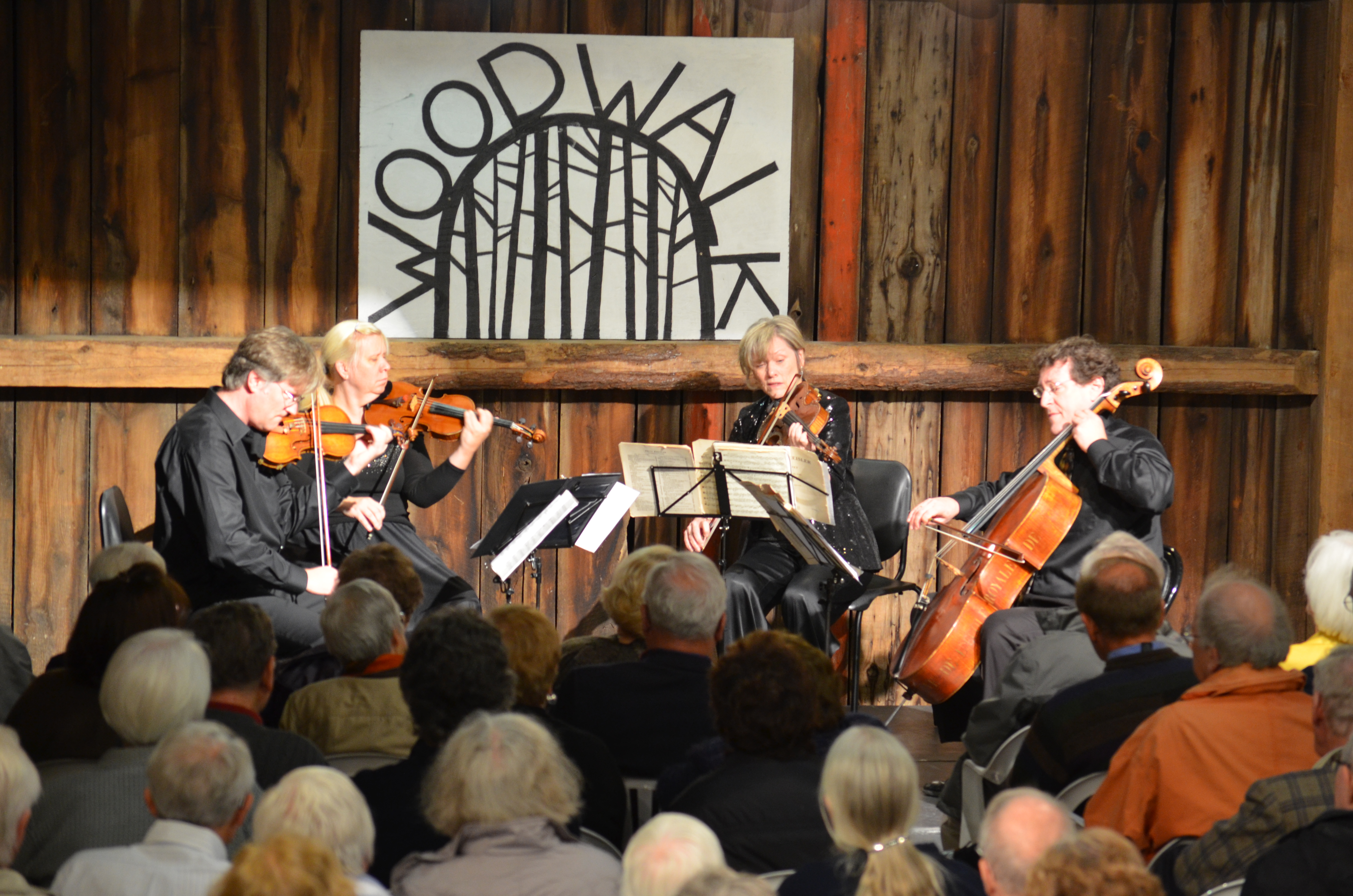
It was a dark and stormy night. No, it was a COLD and dark and stormy night. It was the kind of night you would want to curl up in front of a warm fire with a snifter of brandy. Even if you were a diehard fan of chamber music, you wouldn’t want to go out on such a dire evening, especially to hear a string quartet in an unheated barn!
Pity the poor presenters who had thought Friday evening, Sept. 12th would be a good time to feature the Pro Arte String Quartet at Woodwalk Gallery south of Egg Harbor. Pity the poor musicians who were faced with trying to perform a decent concert for, perhaps, few very hardy souls under the most inclement circumstances. Pity the volunteers who had signed up to provide an especially inviting reception to follow the concert, not knowing if their fine refreshments would have any takers.
Last year, Midsummer’s Music presented the Pro Arte Quartet, the world-class quartet in residence at the University of Wisconsin, Madison, in mid-September, and it was a very cold evening. Approximately 100 folks showed up. This year it was even colder. 43 degrees at the beginning of the concert, and a light rain was falling. We feared that those who came the previous year would know better this time and expected a low turnout. Nonetheless, with lousy weather predictions emanating from the weather bureau for days, our advanced sales were strong. But that forecast only got worse as the concert approached.
I expected many who had purchased in advance to stay home, and I certainly didn’t think we would get any kind of walk-in crowd. However, as the saying goes, “The Show Must Go On.” I asked Mark Kunstman, our Executive Director, if he could come up with some heating sources, at least for the musicians. He found a mixture of small electric and propane heaters that we placed around the low stage at Woodwalk. We turned the overhead lighting up full blast to get its additional heat. At best, we may have raised the temperature on the stage to the mid 50s.
Allyn Walker and Margaret Lockwood at the Woodwalk Gallery have dealt with such situations before. They have an old fashioned cart that contains a stack of blue army blankets that they place by the entrance. Each one will accommodate two people in a warm and cozy configuration.
Door County audiences are tough. They have survived similar situations at Peninsula Players, AFT, and Door Shakespeare. Deep down, for many audience members, it is the red badge of courage to have survived such a performance. There actually seems to develop a kind of camaraderie in these circumstances, especially if the concert/presentation is especially worthy.
Much to my surprise, by the time our concert was supposed to start, virtually every seat was taken. We had well more than eighty well bundled-up folks on hand, including a number of walk-ins. The quartet played as if they were in Carnegie Hall. The audience responded, but it was hard at first to discern if their warm applause was to get the blood flowing or for their hearty appreciation. Perhaps it was some of both.
For the second half of the program, the quartet had invited clarinetist and fellow faculty member Linda Bartley to join them in the Clarinet Quintet by Mozart. Being a wind player, I knew our guest performers faced some challenging difficulties. Having played in the Grant Park Music Festival Orchestra on Chicago’s lakefront for over 30 years, my wife and I know a little bit about playing under such circumstances.
Significant variations in temperature cause equal variations in pitch for the different instruments, especial when you mix winds and strings. When the temperature goes up, wind instruments go higher in pitch because the vibrations from the mouthpiece are transmitted more quickly through the instrument. It has the same effect as shortening the instrument, which would make it higher pitched (think of the short piccolo versus the lengthy bassoon). Strings, on the other hand, go flatter (lower in pitch) in warmer weather as the tension on their strings relaxes).
In the cold of Sept. 12, it was the opposite. The poor clarinet was facing a daunting evening of being way below the strings whose pitch would be raised by the cold. Fortunately, the Pro Arte understood the dilemma and tuned their instruments significantly lower. The result was perfection. No one would have known that they were dealing with such circumstances. The result was the same world-class outcome that Door County audiences have come to expect from this group, regardless of the situation.
During the latter part of the second half of the concert the rain became so intense it threatened to drown out the concert. Cellist Parry Karp looked toward the metal roof high overhead to try to discern where that extraneous sound was coming from and then dug back into his cello with even more fervor.
The remarkable thing was the great camaraderie among the audience members. The spirits were high, the enthusiasm great, almost no one left early as more and more blankets were unfurled from the cart. A great camp-type concert led to an equally enthusiastic reception. The wonderful food and drink seemed to spur talk and hugs and embraces for far longer than the normal concert. It was as if all felt that they had been at a very special event and didn’t want to leave. Perhaps it was because it was the last of our summer performances. Perhaps it was the arduous situation all had endured. Perhaps it was just a great evening of music with wonderful food and drink in which all had achieved something truly great regardless of the situation.
Regardless of the many obstacles, everyone seemed to come away elated. Audience and musicians had overcome the worst and had a really rewarding time. The reception that followed only served to cement these feelings and the warmth for each other, despite the temperature. What a great way to remember the 24th season as we head into a big silver anniversary. Please visit www.midsummersmusic.com to stay in touch for a great season in the coming year, and thanks for your generous support over the years.
